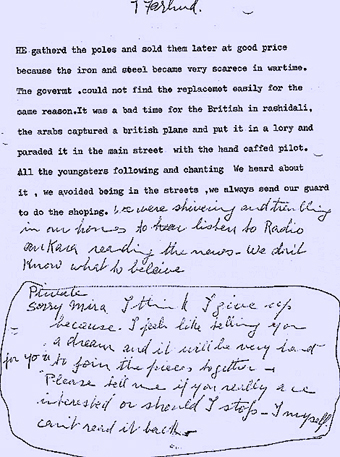Origins
‘I feel like telling you
a dream…’
THIS EXTRACT (right) from my mother’s original manuscript shows how painful the memories sometimes were. ‘Please tell me if you really are interested or should I stop,’ she wrote to me in 1987. ‘I myself can’t read it back.’
I enjoyed a special bond with my mother, probably due to the extraordinary circumstances surrounding my birth during ‘the black month of Rashid Ali.’ It was all blackout, curfew and hiding when I was born in the house of Aunt Na’ima, while the tyrant and his cohorts railed against our people.
Shivering and trembling in their homes, they did not know much worse was to come. I was only two weeks old, and Lena still a toddler, when the family endured two horrific days and nights. Muslim mobs stormed the Jewish quarters, attacking people and property on a rampage that left 187 people dead. It became known as the the Farhud — a word meaning ‘violent dispossession.’
ARCHIVE
Violette began writing her memoirs in the mid-1980s as a means of staying in touch when I left London, together with my husband Tony, to live in France and Italy. Over the following years, these treasured stories, anecdotes and occasional short essays built up into an impressive archive as a testimony for the younger generations who had little or no clue about their family history or communal identity.
There was nothing else in mind except, possibly, the creation a family album showing the rich and vibrant heritage her grandchildren (and now great-grandchildren) could be proud of — with the addition of a lexicon of the Judeo-Arabic language, spoken only by older people today and therefore in danger of extinction. For as Violette reminds those readers unfamiliar with the story of the break-up of the oldest of all Jewish communities: ‘Once uprooted from Baghdad, we scattered all over the world like feathers from a pillow, never to be reunited.’
Eventually, the disastrous events that have overtaken Iraq compelled the authors to listen to the advice of friends who said the work deserved a wider audience. Tony began researching the Farhud — and this early 20th century tale of Arabian nights with its revelations of a shameful episode in British diplomacy sprang off the page.

